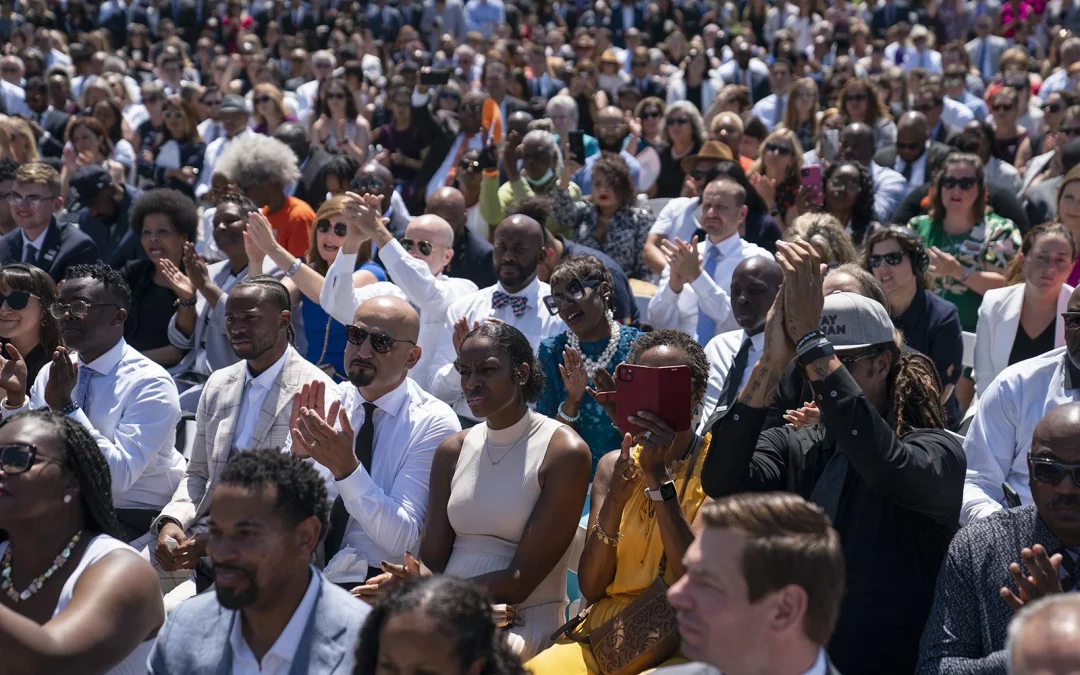
by Adelle M. Banks and Jack Jenkins, RNS | Jul 12, 2022 | Headline News, Social Justice |
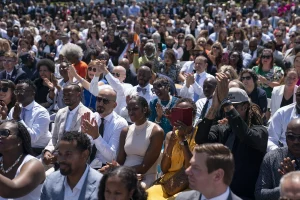
(RNS) — Faith leaders from a wide range of traditions, including those whose houses of worship have been attacked, were at the White House Monday (July 11) as members of Congress and other gun control advocates gathered for a White House celebration of the Bipartisan Safer Communities Act, signed into law June 25.
Pastor Mike McBride, the leader of Live Free USA, who has long sought political support to especially help the nation’s urban centers, hailed the signing as an opportunity to address gun violence deaths that do not always make national headlines.
“It’s been a very difficult task to get the death of Black men in this country, much less the death of any Black folks, to receive national attention and intervention,” said McBride. “Even among Democrats — Democrats have not been the most political champions for this work. So it’s taken us 10 years to get to $250 million committed in a bipartisan way.”
On hand were Rabbi Jonathan Perlman and others who endured a mass shooting in 2018 at the Tree of Life Synagogue in Pittsburgh and the Rev. Sharon Risher, whose mother was among the nine African American worshippers killed during the 2015 shooting at Mother Emanuel AME church in Charleston, South Carolina.
“That was beautiful — to see all these heroic people, survivors that have been working for change,” said Shane Claiborne, co-founder of the group Red Letter Christians and leader of an effort that melts down guns into garden tools in observance of the biblical call to turn “swords into plowshares.”
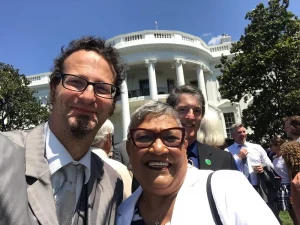 But Claiborne added that he understood that the bipartisan legislation “is the most substantial gun reform bill that we’ve seen in 30 years. But what we also heard is how dysfunctional our political process is — because there’s so much more that’s needed.”
But Claiborne added that he understood that the bipartisan legislation “is the most substantial gun reform bill that we’ve seen in 30 years. But what we also heard is how dysfunctional our political process is — because there’s so much more that’s needed.”
“We need a ban on assault rifles,” he added.
The legislation includes a variety of interventions into gun purchasing, including expansion of background checks for people younger than 21, $250 million for community-based violence prevention initiatives and $500 million to increase the number of mental health staffers in school districts.
President Joe Biden, in remarks from the White House’s South Lawn, decried the violence that has turned houses of worship, schools, nightclubs and stores into places of death.
“Neighborhoods and streets have been turned into killing fields as well,” said the president. “Will we match thoughts and prayers with action? I say yes. And that’s what we’re doing here today.”
Claiborne said he presented a Christian cross made from a melted-down gun barrel to second gentleman Douglas Emhoff, as well as to a friend of President Biden.
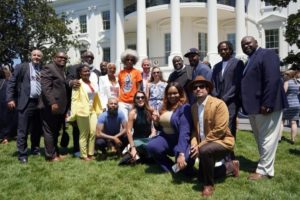 McBride said his efforts with faith leaders on this issue date back to a 2013 meeting at the Obama White House, when Biden was vice president.
McBride said his efforts with faith leaders on this issue date back to a 2013 meeting at the Obama White House, when Biden was vice president.
“In 2013, we asked for $300 million, and we were told no,” he recalled. “And so some 10 years later, we’ve gotten close to that original ask.”
He said the programs for which groups like the Fund Peace Foundation seek support are “targeted for Black and brown communities that are dealing with the highest rates of gun violence,” including from gangs and intimate partners.
Other faith groups have responded to the passage of the legislation with statements of support.
“The investments in mental health services and reasonable measures to regulate guns included in this bill are positive initial steps towards confronting a culture of violence,” said Archbishop Paul S. Coakley of Oklahoma City, chairman of the U.S. Conference of Catholic Bishops’ Committee on Domestic Justice and Human Development.
“We are heartened that after almost three decades of gridlock, Congress has finally taken bipartisan action to address America’s gun violence epidemic and end violent crime,” said Melanie Roth Gorelick, senior vice president of the Jewish Council for Public Affairs. “This is a huge victory, but we cannot allow this to be the end.”
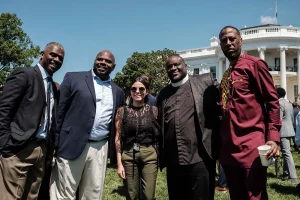 While calling himself grateful for this historic development, McBride said he and his partners will be pushing for far more support.
While calling himself grateful for this historic development, McBride said he and his partners will be pushing for far more support.
“This will be a failure if this is the only thing they do for the next few years,” he said.
Biden seemed to agree that further action was needed.
“We have so much more work to do,” he concluded. “May God bless all of us with the strength to finish the work left undone, and on behalf of the lives we’ve lost and the lives we can save, may God bless you all.”
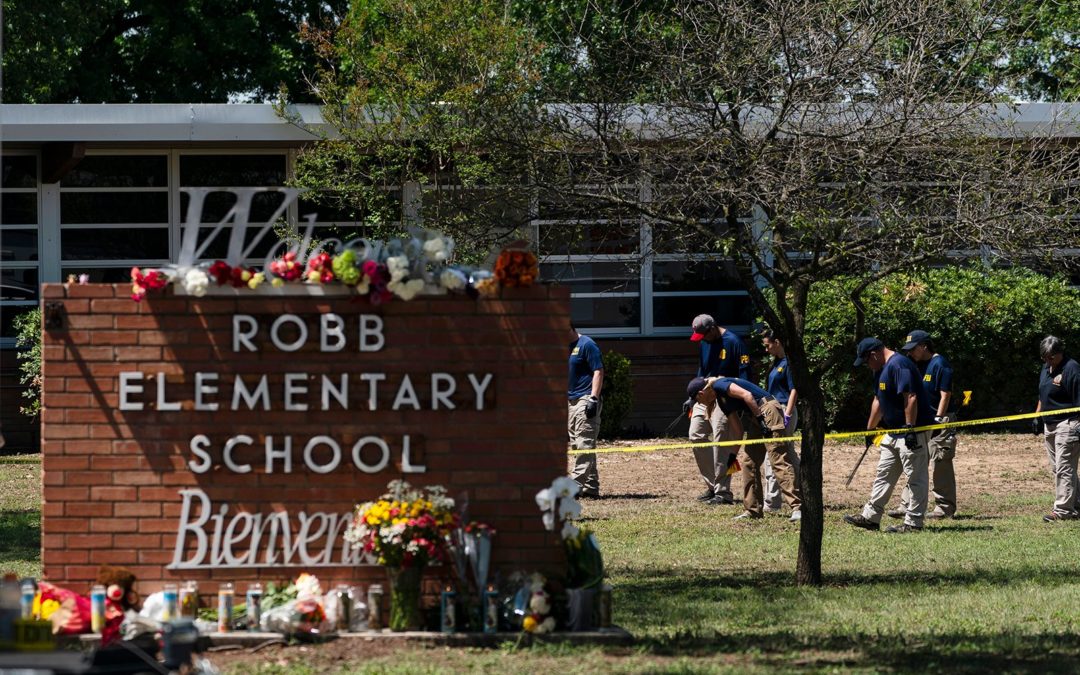
by Alejandra Molina, RNS | May 26, 2022 | Headline News, Social Justice |
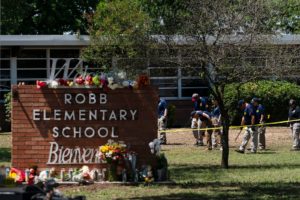
(RNS) — San Antonio Archbishop Gustavo García-Siller was driving back to Uvalde, Texas, on Wednesday morning (May 25) — after having spent most of the previous night there accompanying families in the wake of one of the deadliest school shootings — when he passed by an advertisement promoting guns in the Lone Star State.
“We want children and young people to think differently and the common element to all these situations having happened lately in Buffalo, New York, El Paso and Houston, Texas … the common element is guns, lack of control,” García-Siller told Religion News Service as he was en route to Uvalde.
He condemned gun culture, saying guns are treated as idols and a source of pride among people who may feel like “I am powerful with a gun.”
“We don’t want to give up what that means money-wise, business-wise,” he added.
García-Siller said people can’t be “pro-life” and continue to support laws that allow these kind of shootings to happen. He said a “corrupted political system for years has undermined human beings.”
“If our ethics are not consistent with respecting human life, period, no matter color, language, religion, profession, way of life — life is life — then we are not pro-life,” he said.
Nineteen children and two teachers were killed Tuesday after an 18-year-old gunman stormed into Robb Elementary School in Uvalde, a small, predominantly Latino city of about 16,000 residents. The city sits about 80 miles west of San Antonio. About 1 in 5 residents live in poverty.
“What happened yesterday is one more expression of how we leaders have failed,” García-Siller said.
“I have been many years in the United States and I have been working a lot with immigrants and in very impoverished communities, and it’s just, what else? What else can help us realize that we are people, period,” he added.
After the shooting, García-Siller visited Uvalde Memorial Hospital, where many of the shooting victims were taken Tuesday, and he led Mass at Sacred Heart Catholic Church in Uvalde that evening. He planned to spend the day in Uvalde again on Wednesday.
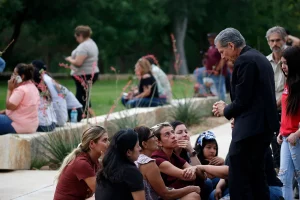 García-Siller has met with the husband of one of the teachers killed in the shooting. The archbishop also spoke with a person who called 911 to report the shooting and referenced a woman who drove children to the hospital from the school. “We don’t need heroes. We need just people of goodwill,” he said.
García-Siller has met with the husband of one of the teachers killed in the shooting. The archbishop also spoke with a person who called 911 to report the shooting and referenced a woman who drove children to the hospital from the school. “We don’t need heroes. We need just people of goodwill,” he said.
While there was a lot of uncertainty on Tuesday as parents awaited news of their children, now there’s a “piercing pain” knowing the outcome, García-Siller said.
Throughout Texas, a number of houses of worship are holding services and prayer vigils to help the community cope with the aftermath.
St. Ann Catholic Church in La Vernia, Texas, is hosting a Mass Wednesday evening in honor of the victims and families of the shooting.
First Baptist Church of Brackettville is hosting a candlelight prayer vigil Wednesday evening. The Rev. Y.J. Jimenez, the pastor there, accompanied parishioners at the hospital who lost their grandchild in the shooting.
Getty Street Church of Christ in Uvalde is also holding a prayer vigil Wednesday for the surrounding community.
And in Houston, religious leaders are planning an interfaith gathering outside the National Rifle Association’s annual convention this Friday.
Megan Hansen, an elder in the Presbyterian Church, and the Rev. Teresa Kim Pecinovsky, a Disciples of Christ pastor and chaplain in Houston, learned about the convention in the aftermath of the Uvalde massacre and felt called to act.
Pecinovsky said those who support the NRA and the gun lobbying industry “are very much rooted in their own religious perspective.”
“It’s important for us as clergy and people of faith to say that is not the only perspective of people with a faith view,” she said.
Living in Texas, Hansen said, “we’re surrounded by so much of this ‘God and guns’ thought.”
“I’m not even going to call it theology, because I don’t understand how you could think about the divine, and not just in Christianity, but many ways that people considered the creation of the world and the Creator and be able to reconcile that with owning a weapon,” Hansen said.
Added Hansen: “This is very much a Christian problem. Which is one reason we want to be witnesses in this, walking with our other faith communities, because it is our problem. It’s coming from inside our house. ”
by Allen Reynolds, UrbanFaith Editor | Apr 28, 2022 | Headline News, Social Justice |
No one can deny that our nation is angry, hurt and frustrated due to the senseless violence that continues to plague us; however, the way we address today’s issues is absolutely critical, particularly for us as Christians. Here are a few suggestions on how we can respond to the violence and pain through active faith.
 Pray in unity.
Pray in unity.
Now, more than ever, the church is commanded to pray in unity. In Matthew 18, Jesus emphasizes the importance of collective spirituality by saying, “If two of you agree here on earth concerning anything you ask, my Father in heaven will do it for you. For where two or three gather together as my followers, I am there among them.” Yes, times are tough and you may find it difficult, but praying together not only obeys these words of Christ, but also serves as a powerful tool of encouragement and reminds us that we are not alone in the struggle. Besides, Christianity is a communal faith, and historically, many African and African-influenced cultures have always valued collective spirituality. Most importantly, we must remember that we serve a God who answers prayer, not always in the ways we expect, but always effective according to His will!
Educate yourself and others.
Hosea 4:6 declares, “For my people perish for lack of knowledge.” In order to actively address today’s issues, it is absolutely critical that we are prepared, both spiritually and intellectually. Take the time to educate yourself on the laws, procedures and government systems that affect both you and your family. However, it is just as important to equip yourself with Scriptures that will assist you in learning strategies that respect government while actively advocating against injustice and violence. Throughout the Bible, Jesus teaches us the importance of knowing your rights as both citizens of your home country and citizens of God’s kingdom. (Matthew 22:15-22, Luke 4:38-53, Mark 3:1-6) It is imperative that you know your rights in order to prevent them from being violated.

Be persistent and hopeful in seeking justice.
In Luke 18, Jesus tells a parable that is not often shared among members of the Church. It is a parable about a persistent woman who goes to a judge to receive justice. Although he is not righteous, the judge gives the woman justice because of her persistence. As Christians, will we have enough faith to be persistent and seek God, even when dealing with a broken and unrighteous government?
The call to action here is clear. Keep seeking justice, even in a broken system, because the persistence will eventually bring about change.
Love your neighbor.
In the midst of all that is going on, this is the key. We have to choose to love our neighbors the way God loves (Matthew 22:38-39). We must love because we have been shown love, even when it is uncomfortable and inconvenient. Showing acts of love to our neighbors, particularly to those who historically have not always shown love in return, will begin to build the bridges across the ravines of fear that divide our nation and lead to the violence in the first place.
It is important to see here that love covers a multitude of sins, the sins that separate us from one another and God. Fear drives a lot of the sin of violence in this nation. It is the fear that we will keep killing one another, fear that things will not change, fear between races, and fear within communities. However, it is perfect love that casts out all fear (1 John 4:18). As Dr. Martin Luther King Jr. said, “I have decided to stick with love. Hate is too great a burden to bear.”
Share your thoughts on the recent violence and your plan of action as a Christian in today’s society below.


 But Claiborne added that he understood that the bipartisan legislation “is the most substantial gun reform bill that we’ve seen in 30 years. But what we also heard is how dysfunctional our political process is — because there’s so much more that’s needed.”
But Claiborne added that he understood that the bipartisan legislation “is the most substantial gun reform bill that we’ve seen in 30 years. But what we also heard is how dysfunctional our political process is — because there’s so much more that’s needed.” McBride said his efforts with faith leaders on this issue date back to a 2013 meeting at the Obama White House, when Biden was vice president.
McBride said his efforts with faith leaders on this issue date back to a 2013 meeting at the Obama White House, when Biden was vice president. While calling himself grateful for this historic development, McBride said he and his partners will be pushing for far more support.
While calling himself grateful for this historic development, McBride said he and his partners will be pushing for far more support.


 García-Siller has met with the husband of one of the teachers killed in the shooting. The archbishop also spoke with a person who called 911 to report the shooting and referenced a woman who drove children to the hospital from the school. “We don’t need heroes. We need just people of goodwill,” he said.
García-Siller has met with the husband of one of the teachers killed in the shooting. The archbishop also spoke with a person who called 911 to report the shooting and referenced a woman who drove children to the hospital from the school. “We don’t need heroes. We need just people of goodwill,” he said. Pray in unity.
Pray in unity.